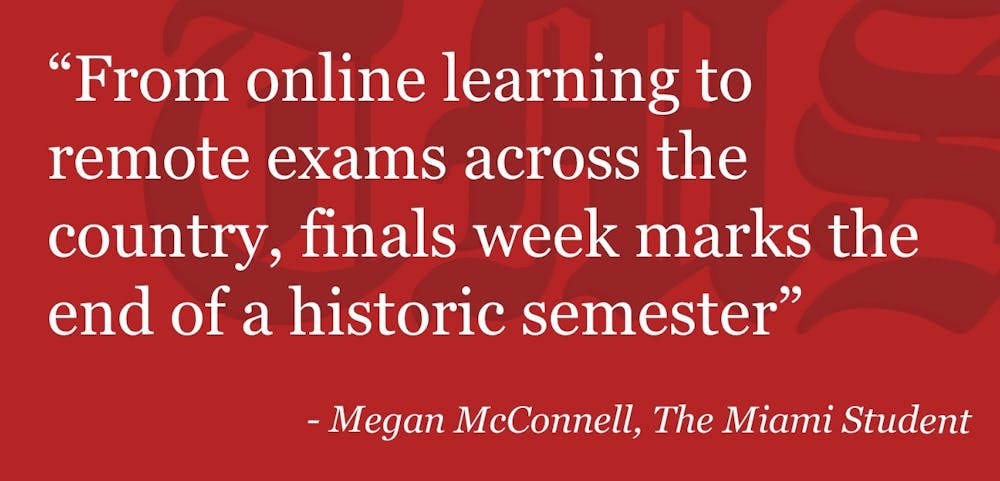For college students, the end of November is marked by turkey of varying quality, plates brimming with stuffing, the first taste of holiday tunes, late nights huddled over textbooks and cramming for fall finals.
However, this semester, instead of spending the first week of December on campus preparing for exams or polishing final papers, students will be scattered across the country in an effort to prevent the spread of COVID-19.
Senior psychology and strategic communications major Victoria Crabtree believes the university made a proactive decision to conduct finals remotely but thinks it’s likely that off-campus students will return to Oxford for finals week.
“A lot of the off-campus people are going to return after Thanksgiving break anyways and take their finals here,” Crabtree said. “I appreciate what [Miami is] trying to do, but I don’t know how effective it really will be.”
Because of large class sizes and elevated risks for COVID-19, many professors like business professor Barbara Myers have chosen to teach their classes completely online. In previous years, Myers has taught classes in the online synchronous, hybrid and face-to-face formats.
“We tried to emulate the face-to-face experience somewhat through online class meetings and the use of online break out rooms,” Myers said.
Students in the First Year Integrated Core (FYIC) at the Farmer’s School of Business have a final project rather than a cumulative exam, paper or portfolio. Each year, the FYIC program coordinates with a company that has asked students to help them solve real-world problems — this year, it’s KeyBank.
“I think our FYIC students are doing a great job and I really look forward to their presentations,” Myers said. “They have been very flexible all semester, whether joining class online from home or Oxford. Beyond the actual course learning objectives, I like to say that COVID-19 has prepared them to work on a distributed team in any large multinational company.”
Although the business program has conducted previous classes online, not all programs at the university were fully prepared to shift to Zoom. This semester, psychology professor Dr. Paul Flaspohler took several variables into account when deciding how to restructure classes.
“I spent a lot of time this summer sitting in on online courses about how to do online teaching,” Flaspohler said. “I tried out a whole bunch of different tools. I was looking at things like FlipGrid, trying to figure out what is going to make this thing engaging and how to make this work. I learned a lot. In the end, [I] made decisions based on the kind of feedback that I got from the students coming into the course.”
Flaspohler’s introductory psychology class has a non-cumulative exam to end the semester.
“In a course like this – where really what we’re trying to do is introduce people to the concepts, teach the vocabulary, give you ideas and get you interested in the topic – I don’t see there being a really high value in having a cumulative exam,” Flaspohler said.
Enjoy what you're reading?
Signup for our newsletter
However, some students do not have many finals or exams. Sophomore psychology and film major Ryan Fleming took all asynchronous classes this semester and has only two final assignments.
“My GPA loves it, but I’d say my consistency and work ethic does not,” Fleming said.
Other students, such as Crabtree, have similar finals to previous years. However, she believes communication between professors and students has been inhibited.
“It’s definitely different,” Crabtree said. “You just don’t know what the professor is looking for because I feel like we don’t talk about the exams as much, but I don’t think it’s necessarily more difficult because even before COVID happened I took some exams online and it was totally fine.”
Flaspohler has tried to combat these communication issues by reaching out to students outside of class.
“My goal is to get as many people in this class successfully through this semester,” Flaspohler said. “My goal is not to figure out who’s smart and who’s not. For that reason, I don’t want this class to be one more thing that’s beating down on people in terms of the overall level of stress that they’re experiencing.”




